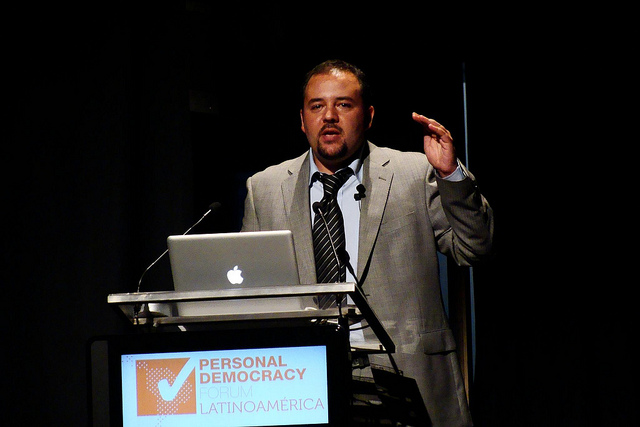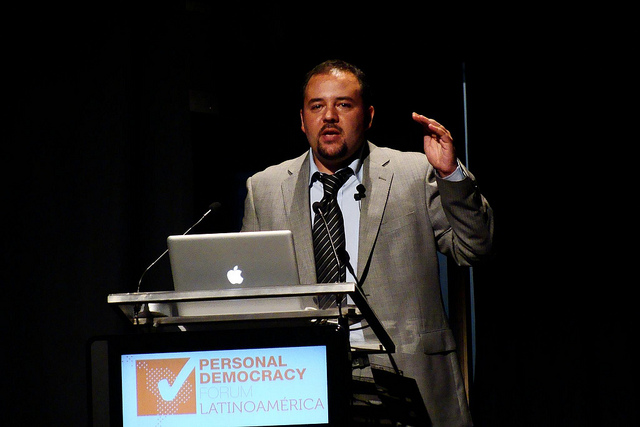
How Poderopedia has promoted transparency in its first year and a half
This article is cross-posted with permission from ICFJ.org.
In its first year and a half of existence, the data journalism platform Poderopedia has promoted transparency and detection of conflicts of interest; generated news stories that made an impact on society; and built alliances with other Latin American organizations.
I founded Poderopedia, which tracks who is who in politics and business, in December 2012 in Chile, with a committed team of journalists and programmers and with financial support from theJohn S. and James L. Knight Foundation.
Miguel Paz, Poderopedia founder. Credit: Personal Democracy Forum América Latina on Flickr.
At the beginning of 2013, ICFJ named Mariana Santos, Mariano Blejman, Gustavo Faleiros and me as Knight International Journalism Fellows. ICFJ wanted to bring together a group of professionals committed to promoting the use of technology, learning and collaboration among media, civic organizations, journalists and programmers in Latin America. The results: Chicas Poderosas, Ecolab, Latin Hackers Hacks, Open Data Latin America, MediaParty and Poderopedia, among other initiatives. Poderopedia has been finalist for the Data Journalism Award 2013 (competing with the likes of The New York Times and The Guardian) and nominated for Best Innovation at the Bobs Awards from Deutsche Welle 2014.
Chile, Venezuela and Colombia. Who’s next?
In my case, the Knight Fellowship allowed me to continue working hard to enhance Poderopedia and to establish international connections that would enable it to grow from a local project into a global initiative.
Since then, and through dozens of training activities and networking across the continent, we launched Poderopedia Venezuela, together with IPYS Venezuela (with local support from Transparency Venezuela and Coalition ProAcceso), and Poderopedia Colombia, which started on June 12, in partnership with Consejo de Redacción (with the support of Open Society Institute Foundations and the School of Communication and Language of the Pontificia Universidad Javeriana).
In both chapters of Poderopedia created in 2014, renowned local investigators do research, work with databases and public information and vet “tips” from the platform’s registered users.
Today, the platform is rich in information about the powerful in Chile, Venezuela and Colombia. Poderopedia’s database includes information about more than 3,500 people, 2,000 companies and 1,600 organizations. Six Chilean newsrooms already republish its content.
It already has more than 1,800 full profiles of entities with their biographies, links, maps of relationships and sources. Meanwhile, registered users amounted to 3,590 people, we have eight volunteers.
The platform has also attracted interest from professionals who have contributed their expertise to the project on their own initiative. Journalist Marcelo Ortiz created a Chrome extension that lets you check if entities that appear in the news are also found on Poderopedia. Programmer Friedrich Lindberg, a current ICFJ Knight International Journalism Fellow, has closely followed the growth of Poderopedia and has made demos with our data, to apply lessons learned for a project in Africa.
From local to global impact
In Chile, Poderopedia has revealed patterns in data that, once shared, have made an impact on the media and the public, contributing to the national debate on transparency and accountability.
For example, Poderopedia showed that Chile’s former Internal Revenue Service Director Julio Pereira owned shares in companies that benefited indirectly by his decisions. The story was covered by CNN, El Mostrador, El Quinto Poder, Cambio 21, El Dínamo, El Clarín, La Nación, ADN Radio and BioBioChile.
We also showed how a Chilean university used a network of companies to irregularly withdraw funds from the institution – a nonprofit organization – (cited in El Dínamo).
Poderopedia revealed that former President Piñera’s cousin and Interior Minister Andrés Chadwick had over US$700,000 in shares of Aguas Andinas, a water supply company that left the Chilean capital without water for two days in the summer of 2013. This story contributed to a public debate on the obligation of the authorities to regularly update their Declarations of Interest statements, as they were not obligated by law to do so.
The research also forced government authorities to address conflicts of interest by Minister Chadwick. It showed how his brother Herman Chadwick was deputy director of the same water company. The news website ElMostrador (a Chilean site similar to Politico) published an article based on the Poderopedia revelations that had 2,012 retweets and was shared on Facebook 7,755 times in less than 48 hours.
Then Poderopedia showed that Education Minister Carolina Schmidt held major shares in seven companies, including La Polar, a retail company accused of money laundering and fraud).
“Republish” option leads to wide sharing
In May 2013, Poderopedia began allowing any media outlet, blog or other website to reuse its content for free under a Creative Commons license. Since then, national media have republished Poderopedia content more than 30 times. Chilean media such as El Dínamo, Radio Bio Bio, El Mostrador, El Mostrador Mercados, and Publimetro and blogs from Andrés Allamand, Pablo Longueira, José Antonio Gómez, Marco Enríquez-Ominami, Marcel Claude, Claudio Orrego Larraín, Andrés Velasco, Michelle Bachelet) and others have used cross-published Poderopedia stories.
To monitor the presidential elections of 2013, Poderopedia conducted live fact- checking via Twitter of candidates’ statements during the 2013 primary presidential debate, which was televised. That information was republished and promoted in the national media. International media as Mexican magazine Dinero also cited Poderopedia’s coverage of the presidential race.
When Michelle Bachelet took office as President, Poderopedia showed who was who in the new cabinet, and discovered that many appointees had legal problems. (Here is one example and the media reaction.)
At the congressional level, the Poderopedia team investigated the new members of the cabinet and members of Parliament. As an example, one of the most important works was the case of Senator Baldo Prokurica, chairman of the Senate Energy Committee, who was also leasing land to energy companies with projects worth over US$1 billion.
Poderopedia under the microcospe
Poderopedia has also been the subject of study in academia and media. Juan Pablo Cárdenas, researcher at Inria Chile and Instituto de Sistemas Complejos de Valparaíso, used Poderopedia to study the networks of power in Chile and to develop an algorithm for levels of power and influence, which he’ll describe in a forthcoming academic paper. He also worked with the Poderopedia team to develop new models of data visualization, which will be announced shortly.
The book Media and Democracy in Chile devoted a chapter to Poderopedia and its influence on the new forms of journalism.
Poderopedia Venezuela
A few months after launching in Venezuela and Colombia, these local Poderopedia chapters are starting to make an impact as well. The Venezuelan team, led by César Batiz, an award-winning investigative journalist, and IPYS have broken several stories. Two examples: 1) President Nicolás Maduro’s son Nicolás Maduro Guerra, who is 23 years old, has become a leading player in the upper echelons of power in Caracas, despite his lack of experience and training. 2) The story of the deep and convoluted networks of narco-general Hugo Carvajal, that became an international story, which was picked up by the Spanish newspaper El País.
The Spanish newspaper El País acknowledges this phenomenon as part of a migration of Venezuelan journalists from print to digital to “escape government censorship” and “economic pressure” which is “inspiring a rise in independent digital media outlets”. El País mentioned Poderopedia Venezuela as an example of this new wave of digital projects where investigative journalists found a free place to keep doing their work.
Poderopedia Colombia
Meanwhile in Bogotá, the Poderopedia team lead by Miriam Forero and Consejo de Redacción, are focusing on Congressional members’ conflicts of interests and their links with business. They’re collaborating with the new Data Unit team at El Tiempo newspaper to analyze the Poderopedia information and turn it into an interactive infographic that lets you see which members of congress have the most conflicts of interest.
What’s next?
The future is promising. We are still seeking and debating about the best model for sustainability but we are optimistic. Meanwhile, we are bootstrapping, providing media consultancy and developing projects for newsrooms.
We invite you to join us and give us feedback to [email protected].
ICFJ Knight International Journalism Fellow Miguel Paz is a Chilean journalist and founder and CEO of Poderopedia, a data journalism website that highlights links among Chile’s business and political elites.
Follow @miguelpaz
Recent Content
-
Journalismarticle ·
-
Journalismarticle ·
-
Journalismarticle ·



